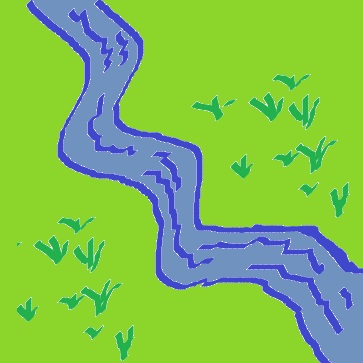Miriam's Legacy
In Deuteronomy 24:8-9 we read this verse, reminding all generations to remember the legacy of Miriam:
In cases of defiling skin diseases, be very careful to do exactly as the Levitical priests instruct you. You must follow carefully what I have commanded them. Remember what the LORD your God did to Miriam along the way after you came out of Egypt.
Miriam is remembered as one of the first female leaders of the Jewish people, the one who led the women in song after they
crossed the Red Sea into freedom. Years later, there is an incident of quarreling, and she is temporarily afflicted
with a leprous condition. It is this incident that is highlighted in the command to remember her. What is her legacy and
why are generations commanded to remember her? We get some ideas from the rest of the chapter [Read Deuteronomy 24:10-22],
which gives commandments about fairness and justice, with a reminder to treat immigrants, widows and orphans, and those who are poor or
oppressed fairly, concluding with a reminder to "remember that you too were once a slave in Egypt."
With inspiration from these verses, here is one way to read Miriam's story, as a five-part journey.
|
[1.] Bitterness
Read Exodus 1:14-22.
|
Her name - Miriam - means bitter. When she was born, her family was facing the worst period in the slavery in Egypt. The Pharaoh had commanded that newborn sons of the Hebrew slaves be killed. Brave women - including the midwives Shiprah and Puah - defied the order, with mothers giving birth in hidden caves, living in secret, hiding boys from the authorities. But imagine how many male children were lost during that time!
|
|
[2.] Openness.
Read Exodus 2:4-10; Exodus 3:1-5.
|
Miriam was a young girl when she and her mother put the 3-month-old Moses into a basket in the river, open to the hope that he could be somehow saved. Miriam was watching nearby when the best thing they could have hoped for happened. The Pharaoh's daughter discovered the boy and loved him and decided to adopt him. Miriam came out of the reeds and offered to find a Hebrew woman to nurse him -- their own mother. Moses grows up, with a heart for people who are oppressed and an openness to see and listen to God.
|
|
[3.] Freedom and Justice.
Read Exodus 15:19-21.
|
Years later freedom comes! After the Israelites cross the Red Sea, we see Miriam leading the women in song, dancing and playing tambourines. They glory in the goodness of God and in the justice done to the soldiers who had pursued them across the sea. Much later, we might struggle with issues of retributive justice, but here we are simply celebrating freedom from slavery and the justice on those who had forced the Hebrew people to lose so many sons and to labor in slavery for so many years of their lives.
|
|
[4.] Cleansing of bitterness.
Read Numbers 12:1-15.
|
Generations are commanded to remember Miriam and to remember an affliction that struck her for seven days.
After some years in the desert, Miriam and Aaron began grumbling about Moses, about his marriage to an outsider,
about whether Moses was the sole voice of God. God confers with all three - Moses, Miriam and Aaron - and Miriam is
suddenly afflicted with a leprous condition. She follows instructions, stays outside the camp for seven days, and at
the end of the seven days she is healed and restored to the camp. Readers can wonder why -- in the midst of such an
amazing life -- we see and remember a story of Miriam afflicted with a leprous condition. Sometimes, especially for a
faithful person like Miriam, a period of illness and recovery can be a period of meditation and spiritual healing
and cleansing. Sometimes an affliction is just an affliction, sometimes a sign, and sometimes a time of cleansing
and reflection, even for the most righteous person of faith. For Miriam, with a heart for justice and freedom,
I think that the seven days outside the camp were a period of cleansing and reflection, a time to restore the
spirit of openness that she carried throughout her life.
|
|
[5] Miriam's Legacy.
Read Numbers 20:1-15.
|
Many years later, Miriam died while the people were camped in the wilderness of Zin, at a place called Kadesh. After her death, while the people were in Kadesh, there was another story of grumbling and restoration. The people complained to Moses and Aaron that there was no water, complaining that they would have been better off staying in Egypt in slavery. God told Moses to gather the people near a rock, and God brought water from the rock, flowing plentifully. This story, and each of the stories of her life, have so many layers of meaning; so many potential connections from one story to the next; so many parallels between the life Miriam lived and the entire history of the Israelites in slavery and freedom.
|
J.M.L.
July 2014 / Updated March 2018
|
